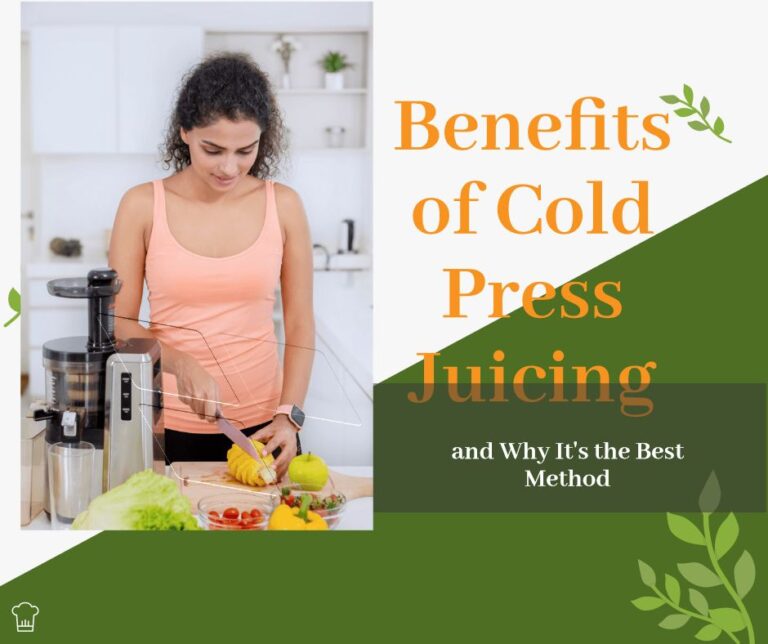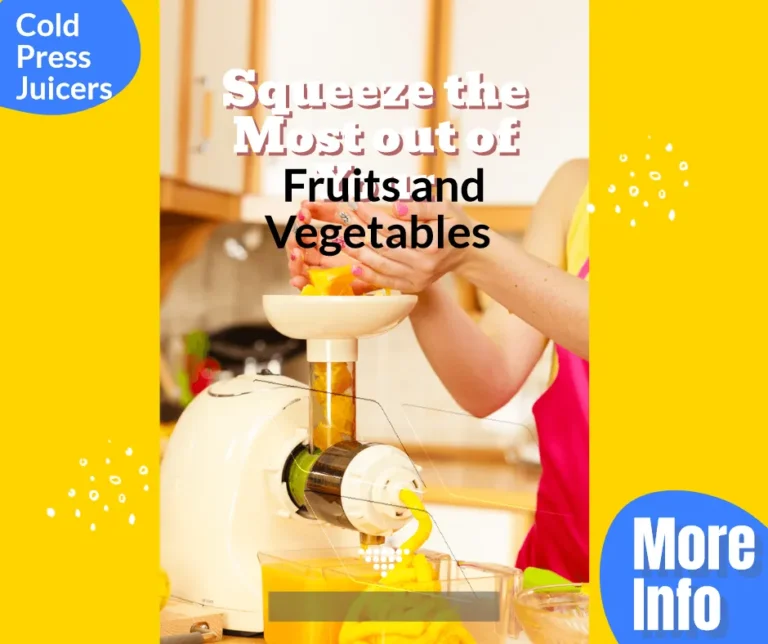Cold Press vs. Centrifugal Juicers

Are you looking to improve your health and incorporate more fresh fruits and vegetables into your diet?
Juicing is a popular and convenient way to do so, and with the surge in popularity, there are now various types of juicers available on the market.
Two of the most common types are the cold press and centrifugal juicers.
Each offers its own unique set of benefits and drawbacks, making it difficult to determine which one is best for you.
In this article, we will delve into the differences between these two juicers and help you make an informed decision on which one is the best fit for your juicing needs.
We will discuss the mechanics of both juicers, the quality of juice they produce, and other factors to consider such as cost and ease of use.
So, whether you are new to juicing or looking to upgrade your current juicer, let’s take a closer look at cold press vs.
centrifugal juicers and which one is the perfect fit for you.
Table of Contents Cold Press vs. Centrifugal Juicers
Understand the key differences between, Cold Press vs Centrifugal Juicers
When it comes to choosing between a cold press juicer and a centrifugal juicer, it’s important to understand the key differences and how they can impact your juicing experience.
A cold press juicer, also known as a masticating juicer, operates at a slower speed and uses a pressing or chewing motion to extract juice from fruits and vegetables.
This gentle process minimizes heat and oxidation, preserving the nutrients and enzymes in the juice.
On the other hand, a centrifugal juicer uses high-speed spinning blades to separate the juice from the pulp.
While this method is faster, it generates more heat and can lead to some loss of nutrients.
Depending on your priorities, whether it’s maximum nutrient retention or convenience and speed, understanding these differences will help you make an informed decision on which type of juicer is best suited for your needs.
Consider your juicing needs carefully
When selecting a juicer, it’s essential to consider your juicing needs carefully.
Think about the types of fruits and vegetables you plan to juice most frequently and the desired outcome of your juices.
If you prioritize nutrient retention and prefer a juice with a longer shelf life, a cold press juicer may be the better option for you.
Its slower speed and gentle extraction process help retain more nutrients and enzymes in the juice, ensuring maximum health benefits.
However, if you value convenience and speed, a centrifugal juicer might be more suitable.
It operates at a higher speed, allowing for quick juicing and easy cleanup.
Take into account factors such as your lifestyle, time constraints, and desired quality of juice to determine which juicer type aligns best with your needs and preferences.
Learn the pros and cons
When considering the choice between a cold press juicer and a centrifugal juicer, it is crucial to weigh the pros and cons of each option.
Understanding the advantages and disadvantages will help you make an informed decision that aligns with your specific requirements.
Cold press juicers excel in preserving nutrients and enzymes due to their slow and gentle extraction process.
This results in juices with enhanced nutritional value and longer shelf life.
On the other hand, centrifugal juicers offer convenience and speed, allowing for quick juicing and easy cleanup.
However, they may not retain as many nutrients as cold press juicers due to their high-speed extraction method.
It is important to consider your priorities, such as nutrient retention, convenience, and desired juice quality, in order to determine which type of juicer best suits your needs.
Determine which is right for you
To determine which type of juicer is right for you, it is essential to consider your individual preferences and priorities.
If you prioritize maximum nutrient retention and are willing to invest a bit more time and effort into the juicing process, a cold press juicer may be the best choice for you.
The slow and gentle extraction method of a cold press juicer ensures that the juice retains more nutrients and enzymes, resulting in a healthier and higher-quality juice.
Additionally, the longer shelf life of cold-pressed juices allows for more flexibility in planning and storing your juice.
On the other hand, if convenience and speed are your main concerns, a centrifugal juicer might be a better fit.
These juicers are known for their fast extraction process, making it quick and easy to enjoy a fresh glass of juice.
They are also generally easier to clean and maintain.
Ultimately, the decision between a cold press and centrifugal juicer depends on your personal preferences and priorities when it comes to nutrient retention, convenience, and the overall quality of your juice.
Consider carefully what aspects matter most to you in order to make the best choice for your juicing needs.
Choosing the Right Juicer
- Cold press vs.
- centrifugal juicers
- Juice quality and nutrient retention
- Speed and efficiency of juicing
- Noise level and ease of cleaning
- Cost and budget considerations
- Personal preferences and juicing needs.
Make an educated juicer choice
When making the decision to invest in a juicer, it’s important to make an educated choice that aligns with your specific needs and preferences.
Understanding the differences between cold press and centrifugal juicers, and how they can impact your juicing experience, will help you make an informed decision.
Cold press juicers, known for their slow and gentle extraction process, are ideal for those seeking maximum nutrient retention and a higher-quality juice.
With their longer shelf life, they offer flexibility in planning and storing your juice.
On the other hand, if convenience and speed are your top priorities, a centrifugal juicer may be more suitable.
These juicers are designed for fast extraction, allowing you to enjoy a fresh glass of juice quickly.
Additionally, they are generally easier to clean and maintain.
By considering your preferences and the specific features of each type of juicer, you can make a well-informed choice that suits your juicing needs.
Now that you have a better understanding of the differences between cold press and centrifugal juicers, you can make an informed decision on which one is the best for you.
Remember to consider your lifestyle, budget, and juicing goals when making your choice.
Whether you prefer the slow and gentle extraction of cold press or the quick and convenient method of a centrifugal juicer, both options can provide you with delicious and nutritious juice.
It ultimately comes down to personal preference and what works best for you and your juicing needs.
FAQ
What is the main difference between cold press and centrifugal juicers?
When it comes to cold press and centrifugal juicers, the main difference lies in the extraction process.
With a cold press juicer, also known as a masticating juicer, the juice is extracted by slowly crushing and pressing the fruits or vegetables, resulting in minimal heat and oxidation.
On the other hand, centrifugal juicers use high-speed spinning blades to quickly extract juice, which generates more heat and can lead to oxidation.
The slower, gentler process of cold press juicing helps to preserve more nutrients and enzymes in the juice, making it a popular choice among health-conscious individuals.
How does the juicing process differ between cold press and centrifugal juicers?
When using a cold press juicer, you’ll notice that the process is slower but more efficient.
The fruits and vegetables are crushed and pressed to extract the juice, preserving more nutrients and enzymes due to the low heat generated.
On the other hand, with a centrifugal juicer, the process is faster but less gentle.
The produce is chopped and spun at high speeds, which generates heat and can lead to oxidation, resulting in a slightly lower nutrient content.
However, it’s important to note that both juicers have their own advantages and it ultimately depends on your personal preferences and priorities when it comes to juicing.
Which type of juicer is better for preserving nutrients in the juice?
The masticating juicer is the better option for preserving nutrients in the juice.
By using a slow and gentle squeezing motion, it minimizes heat and oxidation, which can degrade the nutritional content.
This type of juicer also extracts a higher yield of juice from produce, ensuring that you get maximum nutrients from your fruits and vegetables.
With its efficient juicing process, the masticating juicer retains more vitamins, minerals, and enzymes, making it the ideal choice for those looking to preserve the nutritional value of their juice.
Are there any specific fruits or vegetables that are better suited for cold press or centrifugal juicers?
When it comes to choosing fruits and vegetables for juicing, both cold press and centrifugal juicers can handle a wide range of produce.
However, some fruits and vegetables may yield better results in each type of juicer.
Cold press juicers are particularly effective for leafy greens like spinach and kale, as well as soft fruits like berries and citrus.
These juicers are also great for extracting juice from hard vegetables like carrots and beets.
On the other hand, centrifugal juicers work well with harder fruits and vegetables such as apples, cucumbers, and celery.
It ultimately depends on your personal preference and the specific juicer you have.
What are the main factors to consider when deciding which type of juicer is best for you?
When deciding which type of juicer is best for you, there are a few main factors to consider.
Firstly, think about your budget and how much you are willing to spend on a juicer.
Additionally, consider the type of fruits and vegetables you plan to juice most frequently, as different juicers may be better suited for specific produce.
Also, think about the ease of use and cleaning of the juicer, as well as its size and storage requirements.
Lastly, consider any specific features or functionalities that are important to you, such as noise level or the ability to make different types of juice.






